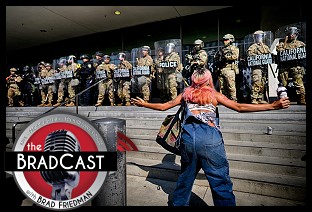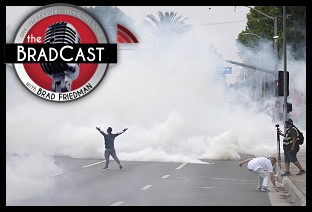 Accountability still matters. Even for apparent Presidential misdeeds from more than 40 years ago, as discussed on today's BradCast. [Audio link to full show follows this summary.]
Accountability still matters. Even for apparent Presidential misdeeds from more than 40 years ago, as discussed on today's BradCast. [Audio link to full show follows this summary.]
Last week, New York Times' Peter Baker had quite a scoop. Ben Barnes, an 85-year old, longtime Democratic operative from Texas, detailed his claim that he and former Democratic Texas Governor turned Republican Presidential candidate John Connally took a trip through Middle Eastern capitals in the summer of 1980 to help convince Iran to not release the 52 Americans being held hostage until after that year's election.
His claim was that Connally, eyeing a cabinet role in the Reagan Administration, was hoping to send the message to Iran that they would get a better deal with Reagan than with Carter. Barnes said the pair were debriefed upon returning stateside by Reagan campaign manager and, later, CIA Director, William Casey. The campaign was reportedly terrified that Carter would win the release of the hostages that year in what would become known as the "October Surprise".
Instead, the hostages were ultimately released within an hour after Reagan being sworn in in January of 1981.
Our guest today, RUSS BAKER, (no relation to the Times' Peter Baker), is a longtime investigative journalist, author and now Editor-in-Chief of WhoWhatWhy.org. He has personally known Barnes for years and tells us that he isn't buying his story in the Times, said to have been revealed now by Barnes because the 98-year old Carter, who recently began hospice care, deserves to know the truth about what really happened.
Baker has been investigating the claim for decades that Casey himself engineered the "traitorous" deal on behalf of the Reagan camp and finds that explanation far more plausible than the Barnes/Connally scheme. Baker wrote his own response to Peter Baker's exclusive in a detailed newsletter article over the weekend headlined "The Iran Hostages, Carter, Reagan, and Bush: What the NY Times ‘Scoop’ Missed."
But whether it happened as Barnes claims or in some other way, Russ Baker, author of the 2009 best seller, FAMILY OF SECRETS: The Bush Dynasty, America’s Invisible Government, and the Hidden History of the Last Fifty Years explains why all of this still matters 43 years later; how the corporate media has largely ignored what would have been an extraordinary scandal by the Reagan campaign, George Bush Sr.'s role in all of this, and how different the world would likely be today if not for Reagan's defeat --- by hook or by crook --- of Carter.
"If Reagan had not been elected, I think it's safe to say that George HW Bush would not have been elected President himself," Baker tells me. "Then we wouldn't have had the Gulf War. His son wouldn't have become President and we wouldn't have had the Iraq War. You might not even have had 9/11, frankly, because a lot of the anger that generated these activities that led to 9/11 [which] had to do with policies that were carried out by these presidencies. Maybe even more importantly, there are huge differences between Democratic and Republican Administrations around climate change. Think of what would have happened if Al Gore had been President. You can be pretty sure we would have had a very different policy years ago about climate change. So our very ability to continue to live on Earth may have been affected by all of these things."
"I don't think they would have changed the media ownership laws. I think there would have been a lot more regulation. I don't think you would have even had a Rupert Murdoch and a Fox News. I don't think you would have had the current composition of the Supreme Court and all of their rulings for business and the wealthy. I think campaign contributions would have been restricted, and that would have changed Congress itself," He continues. "So whatever you want to pick, I think it basically was a coup, by making sure Carter didn't get re-elected. And all of these regimes since then were extensions of that coup government. With some partial breaks, I would say --- people like Clinton and Obama, very very limited in their ability to do much. I think their hands were largely tied. So a very profound change to everything as a result of this October Surprise situation."
As to the corporate media's failure in all of this, it's not that they won't hold Presidents and candidates accountable, says Baker, as he lists a bunch of Democratic candidates and Presidents whose "scandals" have been covered in great detail by the media, "but they seem to go hard only on certain people, and not always for the right reasons."
There is much more to tune in for in today's conversation that it'd be impossible to summarize here.
Finally, we close with some news of the day, including the huge, deadly tornado that ravaged parts of rural Mississippi over the weekend, and the connection to climate change, as Desi Doyen joins to explain.
Also, we have the latest on today's mass shooting at a private Christian elementary school in Nashville, Tennessee, where three 9-year old and three adults were murdered by an assault weapon-wielding 28-year old woman. It was the 129th mass shooting of the year in the U.S., according to CNN and the Gun Violence Archive.
As the breaking news of the shooting was being broadcast live today on Fox "News", a woman whose family was victim to another recent school shooting in a different state happened to be visiting Nashville. She briefly took over the cameras to explain how tired she was of all of this. Fox, after breaking away and then returning to the woman several times, finally cut her off, with anchor John Roberts concurring that he and his colleagues are, in fact, also becoming tired of the carnage. But are they really? You certainly wouldn't know it from all the activism that Fox "News" does in favor of elected officials who continue to block any and all rational gun safety legislation.
We have a few words for Roberts and Fox in response at the end of today's program...
(Snail mail support to "Brad Friedman, 7095 Hollywood Blvd., #594 Los Angeles, CA 90028" always welcome too!)
|


 Sunday 'Total Obliteration' Toons
Sunday 'Total Obliteration' Toons Thank You For Your Attention to This Matter:
Thank You For Your Attention to This Matter: 'Green News Report' 6/26/25
'Green News Report' 6/26/25
 Mamdani Primary 'Win' Augurs New Generation of Progressives Rising: 'BradCast' 6/25/25
Mamdani Primary 'Win' Augurs New Generation of Progressives Rising: 'BradCast' 6/25/25 U.S. Authoritarianism Under-way (But We're Still Here to Fight It): 'BradCast' 6/24/25
U.S. Authoritarianism Under-way (But We're Still Here to Fight It): 'BradCast' 6/24/25 'Green News Report' 6/24/25
'Green News Report' 6/24/25 'Anti-War' Trump Attacks a Mid-East Nation on False Claims About WMD: 'BradCast' 6/23/25
'Anti-War' Trump Attacks a Mid-East Nation on False Claims About WMD: 'BradCast' 6/23/25  Sunday 'Peacemaker' Toons
Sunday 'Peacemaker' Toons Senate Health Care Cuts 'More Extreme' Than House Version: 'BradCast' 6/19/25
Senate Health Care Cuts 'More Extreme' Than House Version: 'BradCast' 6/19/25 'Green News Report' 6/19/25
'Green News Report' 6/19/25 What 'Anti-War President'? MAGA Civil War Over Trump, Iran: 'BradCast' 6/18/25
What 'Anti-War President'? MAGA Civil War Over Trump, Iran: 'BradCast' 6/18/25 Trump Calls for 'Remigration', a Codeword for 'Ethnic Cleansing': 'BradCast' 6/17/25
Trump Calls for 'Remigration', a Codeword for 'Ethnic Cleansing': 'BradCast' 6/17/25 'Green News Report' 6/17/25
'Green News Report' 6/17/25 Last Weekend Today: 'BradCast' 6/16/25
Last Weekend Today: 'BradCast' 6/16/25 Sunday 'Despot Times, Despot Measures' Toons
Sunday 'Despot Times, Despot Measures' Toons Then They Came for the U.S. Senators: 'BradCast' 6/12/25
Then They Came for the U.S. Senators: 'BradCast' 6/12/25 'Green News Report' 6/12/25
'Green News Report' 6/12/25 Lawless Trump Warms Up for Insurrection Act: 'BradCast' 6/11/25
Lawless Trump Warms Up for Insurrection Act: 'BradCast' 6/11/25 Trump Inciting Violence, State of Fear in L.A., Elsewhere: 'BradCast' 6/10/25
Trump Inciting Violence, State of Fear in L.A., Elsewhere: 'BradCast' 6/10/25 Nevermind Elon and Epstein Files, Trump Declares L.A. 'Riots'!: 'BradCast' 6/9/25
Nevermind Elon and Epstein Files, Trump Declares L.A. 'Riots'!: 'BradCast' 6/9/25 'Jesus Weeps' at Trump's
'Jesus Weeps' at Trump's 300k 'Preventable' Deaths Since Trump USAID Shutdown: 'BradCast' 6/4/25
300k 'Preventable' Deaths Since Trump USAID Shutdown: 'BradCast' 6/4/25 Storm Warnings: 'BradCast' 6/3/25
Storm Warnings: 'BradCast' 6/3/25 SCOTUS Ignores Own Precedents In Recent 'Emergency' Rulings: 'BradCast' 6/2/25
SCOTUS Ignores Own Precedents In Recent 'Emergency' Rulings: 'BradCast' 6/2/25 'A World of Tyrants, Bribes, and Influence': 'BradCast' 5/22/25
'A World of Tyrants, Bribes, and Influence': 'BradCast' 5/22/25
 VA GOP VOTER REG FRAUDSTER OFF HOOK
VA GOP VOTER REG FRAUDSTER OFF HOOK Criminal GOP Voter Registration Fraud Probe Expanding in VA
Criminal GOP Voter Registration Fraud Probe Expanding in VA DOJ PROBE SOUGHT AFTER VA ARREST
DOJ PROBE SOUGHT AFTER VA ARREST Arrest in VA: GOP Voter Reg Scandal Widens
Arrest in VA: GOP Voter Reg Scandal Widens ALL TOGETHER: ROVE, SPROUL, KOCHS, RNC
ALL TOGETHER: ROVE, SPROUL, KOCHS, RNC LATimes: RNC's 'Fired' Sproul Working for Repubs in 'as Many as 30 States'
LATimes: RNC's 'Fired' Sproul Working for Repubs in 'as Many as 30 States' 'Fired' Sproul Group 'Cloned', Still Working for Republicans in At Least 10 States
'Fired' Sproul Group 'Cloned', Still Working for Republicans in At Least 10 States FINALLY: FOX ON GOP REG FRAUD SCANDAL
FINALLY: FOX ON GOP REG FRAUD SCANDAL COLORADO FOLLOWS FLORIDA WITH GOP CRIMINAL INVESTIGATION
COLORADO FOLLOWS FLORIDA WITH GOP CRIMINAL INVESTIGATION CRIMINAL PROBE LAUNCHED INTO GOP VOTER REGISTRATION FRAUD SCANDAL IN FL
CRIMINAL PROBE LAUNCHED INTO GOP VOTER REGISTRATION FRAUD SCANDAL IN FL Brad Breaks PA Photo ID & GOP Registration Fraud Scandal News on Hartmann TV
Brad Breaks PA Photo ID & GOP Registration Fraud Scandal News on Hartmann TV  CAUGHT ON TAPE: COORDINATED NATIONWIDE GOP VOTER REG SCAM
CAUGHT ON TAPE: COORDINATED NATIONWIDE GOP VOTER REG SCAM CRIMINAL ELECTION FRAUD COMPLAINT FILED AGAINST GOP 'FRAUD' FIRM
CRIMINAL ELECTION FRAUD COMPLAINT FILED AGAINST GOP 'FRAUD' FIRM RICK SCOTT GETS ROLLED IN GOP REGISTRATION FRAUD SCANDAL
RICK SCOTT GETS ROLLED IN GOP REGISTRATION FRAUD SCANDAL VIDEO: Brad Breaks GOP Reg Fraud Scandal on Hartmann TV
VIDEO: Brad Breaks GOP Reg Fraud Scandal on Hartmann TV RNC FIRES NATIONAL VOTER REGISTRATION FIRM FOR FRAUD
RNC FIRES NATIONAL VOTER REGISTRATION FIRM FOR FRAUD EXCLUSIVE: Intvw w/ FL Official Who First Discovered GOP Reg Fraud
EXCLUSIVE: Intvw w/ FL Official Who First Discovered GOP Reg Fraud GOP REGISTRATION FRAUD FOUND IN FL
GOP REGISTRATION FRAUD FOUND IN FL



















 In what appears to be a momentary pause (of sorts) in the Indictment Watch this week for our disgraced former President, we take the opportunity on today's
In what appears to be a momentary pause (of sorts) in the Indictment Watch this week for our disgraced former President, we take the opportunity on today's  Looks like Donald Trump was not "ARRESTED ON TUESDAY" as
Looks like Donald Trump was not "ARRESTED ON TUESDAY" as  I have no idea what this week is going to bring. As noted on today's
I have no idea what this week is going to bring. As noted on today's  As discussed on today's
As discussed on today's  As we've advised many times on
As we've advised many times on  In the first 43 days of 2023, there were
In the first 43 days of 2023, there were  We've spent quite a bit of time of late on
We've spent quite a bit of time of late on  We really do have (at least) two Americas at this point. One America, led by President Joe Biden and his Democratic party in Congress, who have now triumphantly signed into law the largest climate bill in U.S. history, which also includes landmark measures to make healthcare cheaper for tens of millions of Americans. And another America, which is calling for violence, mayhem and murder of American law enforcement officials, and they are led there by the disgraced former President of the United States. We discuss both Americas on today's
We really do have (at least) two Americas at this point. One America, led by President Joe Biden and his Democratic party in Congress, who have now triumphantly signed into law the largest climate bill in U.S. history, which also includes landmark measures to make healthcare cheaper for tens of millions of Americans. And another America, which is calling for violence, mayhem and murder of American law enforcement officials, and they are led there by the disgraced former President of the United States. We discuss both Americas on today's  While voters were at the polls for primary elections in six states (Arizona, Kansas, Ohio, Michigan, Missouri and Washington) on Tuesday, we take the moment to turn to foreign affairs for a hot minute on today's
While voters were at the polls for primary elections in six states (Arizona, Kansas, Ohio, Michigan, Missouri and Washington) on Tuesday, we take the moment to turn to foreign affairs for a hot minute on today's  On today's
On today's  What's the difference between a white supremacist mass murderer in Buffalo, NY and a GOP candidate for the U.S. Senate? Well, in terms of their racist rhetoric not a heck of a lot, it seems. That and many more reasons to both pay close attention and be skeptical of "conventional wisdom" regarding this November's critical midterm elections on today's
What's the difference between a white supremacist mass murderer in Buffalo, NY and a GOP candidate for the U.S. Senate? Well, in terms of their racist rhetoric not a heck of a lot, it seems. That and many more reasons to both pay close attention and be skeptical of "conventional wisdom" regarding this November's critical midterm elections on today's  These are dark days indeed when the rise of a new Omicron variant turns out to be one of the lighter moments on today's
These are dark days indeed when the rise of a new Omicron variant turns out to be one of the lighter moments on today's  The bad news for democracy continues overseas on today's
The bad news for democracy continues overseas on today's  Like the Energizer Bunny, the stories on today's
Like the Energizer Bunny, the stories on today's 












